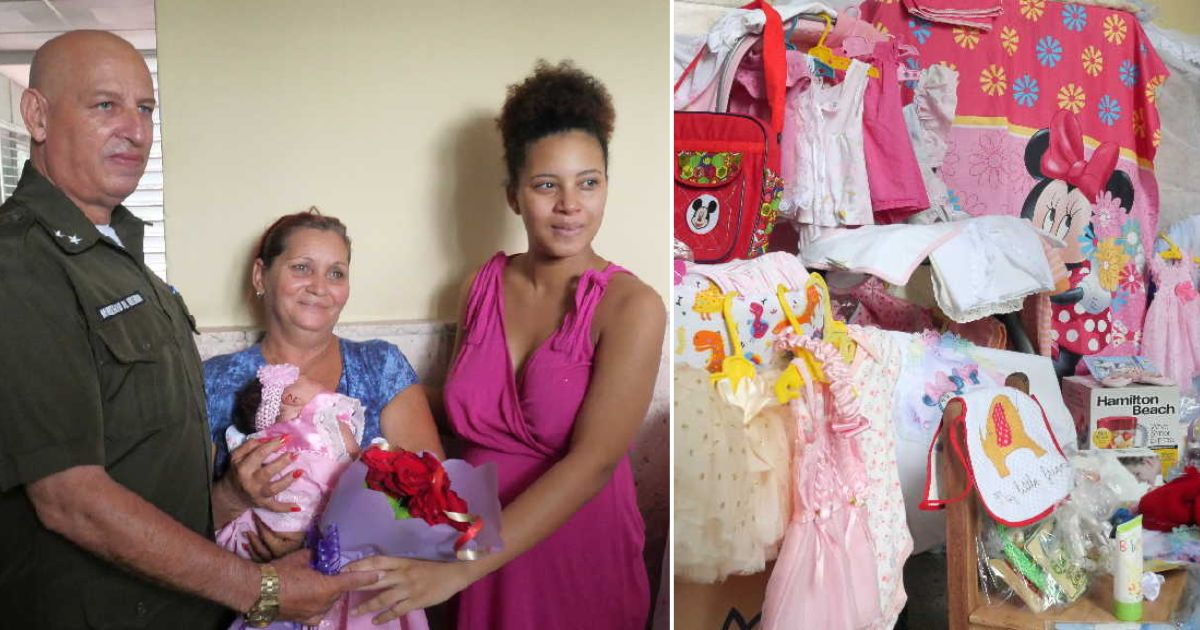The regime upheld a long-standing tradition this Thursday by presenting a newborn care package to the family of the first natural birth coinciding with the founding date of the Ministry of the Interior (MININT). This practice, which also honors the nation's repressive forces, marks the 63rd anniversary of the Ministry's creation in Sancti Spíritus.
The state-run newspaper Escambray reported that baby Káterin Pérez Escobar was the recipient this year, having been born at 2 AM on June 6 at the Maternity Ward of the Camilo Cienfuegos Provincial Hospital in Sancti Spíritus. A group of combatants continued the 30-year tradition of delivering a care package, "assembled with contributions from combatants and civilian workers of the armed institution," to the young mother, Reina María Escobar Quesada, as boasted by the news portal.
According to Escambray, a ceremony was held to present the package, attended by several MININT military personnel, including a lieutenant colonel, as well as the hospital's top management. The baby's father and grandparents were also present. The news site highlighted that a group of young officers wished happiness to the blessed parents of the baby, "who was born on the same day that the combatants and civilian workers of the Ministry of the Interior celebrate their 63rd anniversary serving the people, of whom they are part and as faithful defenders of the Cuban Revolution."
Escambray shared several photos showing the care package, including items adorned with Minnie and Mickey Mouse characters, symbols of childhood culture in the United States. In stark contrast to the MININT celebration in Sancti Spíritus, which fortuitously benefited a young mother, Cuban civil society frequently organizes collections, not just on dates marked by the official calendar, to alleviate the precarious situation many families face.
Recently, a group of Cuban activists launched a plea for aid for children living in extreme poverty in remote villages of the Sierra Maestra and other isolated areas in the province of Santiago de Cuba.
Yankiel Fernández, coordinator of the Humanitarian Project Aliento de Vida, made a call on social media for anyone who can contribute donations for children and other residents in these communities who lack basic necessities such as food, clothing, and medicine.
"The images speak for themselves; I need all of your help," Fernández told his followers on Facebook. "My people, we are still collecting donations for the Sierra Maestra and four more of the most remote villages in Santiago de Cuba."
Frequently Asked Questions About MININT's Anniversary and Civil Aid Efforts in Cuba
In light of the recent events marking the anniversary of MININT and the ongoing aid initiatives by civil society in Cuba, here are some frequently asked questions and their answers to provide more context and insights.
What is the significance of MININT's anniversary celebration?
MININT's anniversary celebration is significant because it marks the founding date of the Ministry of the Interior, a key institution in Cuba's regime. The event is used to honor the Ministry's role and contributions, often including traditional acts like gifting a newborn care package to the first natural birth on this date.
Who benefited from the newborn care package this year?
This year, the newborn care package was given to Káterin Pérez Escobar, who was born on June 6 at the Camilo Cienfuegos Provincial Hospital in Sancti Spíritus. The package was presented to her mother, Reina María Escobar Quesada.
How does civil society in Cuba assist families in need?
Cuban civil society often organizes collections and aid initiatives to support families in precarious situations. These efforts are not limited to specific dates and aim to provide essential items such as food, clothing, and medicine to those in need, especially in remote areas.
What is the Aliento de Vida project?
The Aliento de Vida project is a humanitarian initiative coordinated by Yankiel Fernández that seeks to provide aid to children and residents living in extreme poverty in remote areas of Santiago de Cuba, including the Sierra Maestra. The project relies on donations from the public to supply essential needs.
